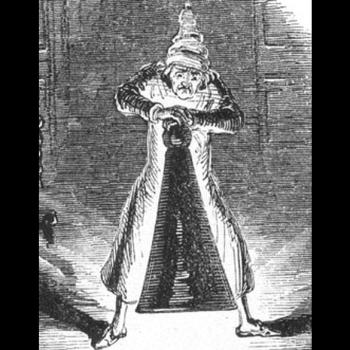~ Might our acts of devotion and piety display a controlling and patriarchal view of God? ~

Your oldest brother Credence is standing in the hallway with one foot raised, poised mid-step.
“What in the world are you doing?” you ask.
“I’m waiting to hear from dad.”
“Waiting to hear from dad?” you say in disbelief.
“My pastor said that in order to make dad happy, I need to be obedient, even in the little things. So I’m waiting to hear dad’s voice in my head. He’ll tell me what to do next.”
“That’s ridiculous, Credence,” you say, shaking your head. “Why don’t you just take a step?”
“I don’t want to get it wrong,” he says. “I want to please dad.”
“Before he went away,” you say, “father taught us everything we need to know about making responsible decisions. He even wrote it down. He gave us the authority to manage his estate and represent him. So stop acting like a child. Do you know how ridiculous you look?”
“It’s not ridiculous,” he says. “I’m learning obedience. When dad gets back from his trip, I want to hear him say, ‘Well done.’ I don’t want to see him just frown at me and shake his head.”`
“Dad is not like that! He trusts you. He believes in you!”
“At church, we share stories about how we don’t make decisions until we hear our dad’s voices in our heads. It’s super cool in a religious sort of way. It makes us feel faithful and obedient and close to our dads.”
“Your view of dad is all wrong. He’s not a super-controlling patriarch,” you say. “You sound like the Pharisees, trying to outdo each other in piety.”
Credence shrugs, still balancing on one foot. “Piety is cool.”
“And you’re arrogant,” you add. “I bet you can’t wait to pat each other on the back and get all proud about the dumb things you do like standing on one foot.”
“It’s not dumb,” Credence says.
“You know how subjective you are, right? These voices are filtered 100 percent through your biases and emotions.”
“If I get my thoughts aligned right and if I and enter into the mystical presence of father, I can actually hear his voice.”
“You’re confusing dad’s voice with your own prejudiced thoughts in your prejudiced brain. You’re also taking dad’s name in vain by claiming he’s speaking in your head. He told us not to make dumb decisions and blame him by misusing his name and his authority.”
Credence only shakes his head and remains standing like a stork in a stream.
“Where’s Diffidence?” you ask.
“I’m in here.”
The muffled voice comes from your younger brother’s bedroom. You open the door to see Diffidence cowering on the edge of his bed.
“What are you doing?” you ask.
“I can’t move,” he says.
“Why can’t you move?” you ask.
“Last time I went out there, I displeased father. I heard his voice in my head, telling me how disappointed he was that I’d made the wrong decision. Then a dark cloud of disfavor settled over me.”
“That was your thoughts and your emotions, not father!” you insist. “And stop taking his name in vain. It’s your voice in your head, not his!”
“Last week he totally abandoned me when I went in the front yard instead of the back yard,” Diffidence says.
“He did not abandon you! He’s not like that!”
“When I make the right decision, dad usually gives me a little blessing, like money or a treat. Sometimes it’s a huge blessing, like a healing or a rainbow in the sky. But if I make the wrong decision, he withholds his blessing.”
“I can’t believe how superstitious you are! Dad is not your dog trainer, leaving you treats when you do good and swatting you when you do bad. He doesn’t only bless those who make so-called ‘right decisions.’ Stop being so superstitious!”
“It helps if I study and meditate for a few hours before making decisions.” Diffidence points to a pile of books. “I have a little meditation ritual for staying out of trouble. It helps me avoid father’s wrath and displeasure by making the right choices.”
“He’s not that kind of a father!” you exclaim. “Those are your feelings and your thoughts, not his. Who would want a father who controlled your every move? Our father is love, through and through. Even when we mess up he still loves us and won’t abandon us.”
“It sounds like you don’t believe father speaks to us anymore,” Credence says.
“Of course he speaks to us,” you say, “but not with obscure signs and voodoo curses and rewards. You’re like a jungle tribe from one of those old movies, trying to find the right sacrifice to appease the volcano god. I wish you could understand how loving our father is. He already gave you all the wisdom and authority you need, so act in it. And if you’re not sure what choice to make, ask your siblings. We’re family. We’re here to help each other. We’re better representatives of dad than subjective voices in your head. He put us right here beside you to help you make responsible decisions that conform to his mind. We’ll help you be a good steward of his estate until he returns.”
“So you’re asking me to trust you more than the voice in my head?” asks Diffidence.
“Absolutely. Trust me and the whole family. And be assured, dad will never frown at you for making an unwise choice. Father loves you way too much to play you like that. So act responsibly in his love and favor and the authority that he’s given you.”
“[The kingdom of heaven] will be like a man going on a journey, who called his servants and entrusted his wealth to them … After a long time the master of those servants returned and settled accounts with them … His master replied, ‘Well done, good and faithful servant! You have been faithful with a few things; I will put you in charge of many things. Come and share your master’s happiness!’” — Matthew 25:14.19.21
“When [the ‘prodigal son’] came to his senses, he said, ‘How many of my father’s hired servants have food to spare, and here I am starving to death! I will set out and go back to my father and say to him: Father, I have sinned against heaven and against you. I am no longer worthy to be called your son; make me like one of your hired servants.’ So he got up and went to his father. But while he was still a long way off, his father saw him and was filled with compassion for him; he ran to his son, threw his arms around him and kissed him.” — Luke 15:17-20
Image by waldryano / Pixabay.
















